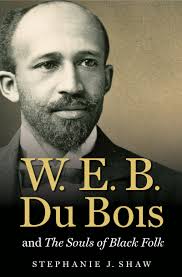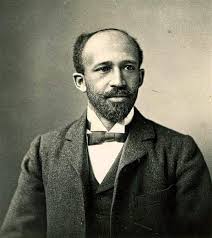The Souls of Black Folk Page #25
The Souls of Black Folk is a 1903 work of American literature by W. E. B. Du Bois. It is a seminal work in the history of sociology and a cornerstone of African-American literature. The book contains several essays on race, some of which the magazine Atlantic Monthly had previously published.
Down in Darien, where the Delegal riots took place some summers ago, there used to come a strong protest against slavery from the Scotch Highlanders; and the Moravians of Ebenezer did not like the system. But not till the Haytian Terror of Toussaint was the trade in men even checked; while the national statute of 1808 did not suffice to stop it. How the Africans poured in!—fifty thousand between 1790 and 1810, and then, from Virginia and from smugglers, two thousand a year for many years more. So the thirty thousand Negroes of Georgia in 1790 doubled in a decade,—were over a hundred thousand in 1810, had reached two hundred thousand in 1820, and half a million at the time of the war. Thus like a snake the black population writhed upward. But we must hasten on our journey. This that we pass as we near Atlanta is the ancient land of the Cherokees,—that brave Indian nation which strove so long for its fatherland, until Fate and the United States Government drove them beyond the Mississippi. If you wish to ride with me you must come into the “Jim Crow Car.” There will be no objection,—already four other white men, and a little white girl with her nurse, are in there. Usually the races are mixed in there; but the white coach is all white. Of course this car is not so good as the other, but it is fairly clean and comfortable. The discomfort lies chiefly in the hearts of those four black men yonder—and in mine. We rumble south in quite a business-like way. The bare red clay and pines of Northern Georgia begin to disappear, and in their place appears a rich rolling land, luxuriant, and here and there well tilled. This is the land of the Creek Indians; and a hard time the Georgians had to seize it. The towns grow more frequent and more interesting, and brand-new cotton mills rise on every side. Below Macon the world grows darker; for now we approach the Black Belt,—that strange land of shadows, at which even slaves paled in the past, and whence come now only faint and half-intelligible murmurs to the world beyond. The “Jim Crow Car” grows larger and a shade better; three rough field-hands and two or three white loafers accompany us, and the newsboy still spreads his wares at one end. The sun is setting, but we can see the great cotton country as we enter it,—the soil now dark and fertile, now thin and gray, with fruit-trees and dilapidated buildings,—all the way to Albany. At Albany, in the heart of the Black Belt, we stop. Two hundred miles south of Atlanta, two hundred miles west of the Atlantic, and one hundred miles north of the Great Gulf lies Dougherty County, with ten thousand Negroes and two thousand whites. The Flint River winds down from Andersonville, and, turning suddenly at Albany, the county-seat, hurries on to join the Chattahoochee and the sea. Andrew Jackson knew the Flint well, and marched across it once to avenge the Indian Massacre at Fort Mims. That was in 1814, not long before the battle of New Orleans; and by the Creek treaty that followed this campaign, all Dougherty County, and much other rich land, was ceded to Georgia. Still, settlers fought shy of this land, for the Indians were all about, and they were unpleasant neighbors in those days. The panic of 1837, which Jackson bequeathed to Van Buren, turned the planters from the impoverished lands of Virginia, the Carolinas, and east Georgia, toward the West. The Indians were removed to Indian Territory, and settlers poured into these coveted lands to retrieve their broken fortunes. For a radius of a hundred miles about Albany, stretched a great fertile land, luxuriant with forests of pine, oak, ash, hickory, and poplar; hot with the sun and damp with the rich black swamp-land; and here the corner-stone of the Cotton Kingdom was laid. Albany is to-day a wide-streeted, placid, Southern town, with a broad sweep of stores and saloons, and flanking rows of homes,—whites usually to the north, and blacks to the south. Six days in the week the town looks decidedly too small for itself, and takes frequent and prolonged naps. But on Saturday suddenly the whole county disgorges itself upon the place, and a perfect flood of black peasantry pours through the streets, fills the stores, blocks the sidewalks, chokes the thoroughfares, and takes full possession of the town. They are black, sturdy, uncouth country folk, good-natured and simple, talkative to a degree, and yet far more silent and brooding than the crowds of the Rhine-pfalz, or Naples, or Cracow. They drink considerable quantities of whiskey, but do not get very drunk; they talk and laugh loudly at times, but seldom quarrel or fight. They walk up and down the streets, meet and gossip with friends, stare at the shop windows, buy coffee, cheap candy, and clothes, and at dusk drive home—happy? well no, not exactly happy, but much happier than as though they had not come. Thus Albany is a real capital,—a typical Southern county town, the centre of the life of ten thousand souls; their point of contact with the outer world, their centre of news and gossip, their market for buying and selling, borrowing and lending, their fountain of justice and law. Once upon a time we knew country life so well and city life so little, that we illustrated city life as that of a closely crowded country district. Now the world has well-nigh forgotten what the country is, and we must imagine a little city of black people scattered far and wide over three hundred lonesome square miles of land, without train or trolley, in the midst of cotton and corn, and wide patches of sand and gloomy soil. It gets pretty hot in Southern Georgia in July,—a sort of dull, determined heat that seems quite independent of the sun; so it took us some days to muster courage enough to leave the porch and venture out on the long country roads, that we might see this unknown world. Finally we started. It was about ten in the morning, bright with a faint breeze, and we jogged leisurely southward in the valley of the Flint. We passed the scattered box-like cabins of the brickyard hands, and the long tenement-row facetiously called “The Ark,” and were soon in the open country, and on the confines of the great plantations of other days. There is the “Joe Fields place”; a rough old fellow was he, and had killed many a “n*gger” in his day. Twelve miles his plantation used to run,—a regular barony. It is nearly all gone now; only straggling bits belong to the family, and the rest has passed to Jews and Negroes. Even the bits which are left are heavily mortgaged, and, like the rest of the land, tilled by tenants. Here is one of them now,—a tall brown man, a hard worker and a hard drinker, illiterate, but versed in farmlore, as his nodding crops declare. This distressingly new board house is his, and he has just moved out of yonder moss-grown cabin with its one square room.
Translation
Translate and read this book in other languages:
Select another language:
- - Select -
- 简体中文 (Chinese - Simplified)
- 繁體中文 (Chinese - Traditional)
- Español (Spanish)
- Esperanto (Esperanto)
- 日本語 (Japanese)
- Português (Portuguese)
- Deutsch (German)
- العربية (Arabic)
- Français (French)
- Русский (Russian)
- ಕನ್ನಡ (Kannada)
- 한국어 (Korean)
- עברית (Hebrew)
- Gaeilge (Irish)
- Українська (Ukrainian)
- اردو (Urdu)
- Magyar (Hungarian)
- मानक हिन्दी (Hindi)
- Indonesia (Indonesian)
- Italiano (Italian)
- தமிழ் (Tamil)
- Türkçe (Turkish)
- తెలుగు (Telugu)
- ภาษาไทย (Thai)
- Tiếng Việt (Vietnamese)
- Čeština (Czech)
- Polski (Polish)
- Bahasa Indonesia (Indonesian)
- Românește (Romanian)
- Nederlands (Dutch)
- Ελληνικά (Greek)
- Latinum (Latin)
- Svenska (Swedish)
- Dansk (Danish)
- Suomi (Finnish)
- فارسی (Persian)
- ייִדיש (Yiddish)
- հայերեն (Armenian)
- Norsk (Norwegian)
- English (English)
Citation
Use the citation below to add this book to your bibliography:
Style:MLAChicagoAPA
"The Souls of Black Folk Books." Literature.com. STANDS4 LLC, 2025. Web. 8 Jan. 2025. <https://www.literature.com/book/the_souls_of_black_folk_310>.




Discuss this The Souls of Black Folk book with the community:
Report Comment
We're doing our best to make sure our content is useful, accurate and safe.
If by any chance you spot an inappropriate comment while navigating through our website please use this form to let us know, and we'll take care of it shortly.
Attachment
You need to be logged in to favorite.
Log In